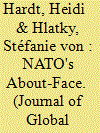|
|
|
Sort Order |
|
|
|
Items / Page
|
|
|
|
|
|
|
| Srl | Item |
| 1 |
ID:
173123


|
|
|
|
|
| Summary/Abstract |
This article examines the coherence of the North Atlantic Treaty Organization’s (NATO) coordinated military strategy during the war in Afghanistan. We argue that much of this coherence can be lost when decision makers adopt multinational strategic guidance that is then interpreted by different national contingents operationally. Different strategic and military cultures across troop-contributing countries may account for observed variation in operational outcomes, but better theoretical tools are needed to examine this phenomenon. Our aim is to further scholars’ understanding of how cultural variables can affect mission outcomes. This assumed effect of strategic and military cultures is explored empirically with reference to the Canadian and German Provincial Reconstruction Teams in Afghanistan, which formed part of the NATO-led ISAF operation.
|
|
|
|
|
|
|
|
|
|
|
|
|
|
|
|
| 2 |
ID:
171807


|
|
|
|
|
| Summary/Abstract |
Scholars in global security studies have only recently focused attention on how and why international security organizations (ISOs) adapt. Since the United Nations Security Council's issuance of Resolution 1325, some ISOs have enacted changes to implement gender mainstreaming. The concept involves incorporating gender-based analyses in policy and planning and increasing women's representation. Drawing on interviews with seventy-one elites and a dataset of ninety-seven NATO gender guidelines, this article introduces an original argument for why NATO adapted to gender mainstreaming. Such adaptation is surprising given the military's historical resistance to gender considerations and that civilian bodies typically enact reforms. Findings indicate that other ISOs were substantially influential in the process and that institutional incentives built into NATO's military bodies drove military officials to implement mainstreaming in practice. Additionally, military elites perceived a link between gender mainstreaming and operational effectiveness, which further consolidated organization-wide adaptation. This study challenges long-held assumptions about militaries’ resistance to gender-related changes. It also offers one of the first empirical assessments of gender mainstreaming in an ISO.
|
|
|
|
|
|
|
|
|
|
|
|
|
|
|
|
| 3 |
ID:
157986


|
|
|
|
|
| Summary/Abstract |
Why does joint defence production of advanced weapons systems, which appears like a logical choice at first, become harder for both the primary production state and its allies to manage and justify as the acquisition process runs its course? To answer this question, we analyze the multinational politics of the F-35 JSF with a focus on how secondary states who have bought into the program are affected by domestic politics within the primary production state. We find that US congressional and bureaucratic politics, cuts to US defence spending, and a desire to retain tight control over the program has locked allies into a program with which they have little leverage. Potentially losing the ability to fight along side the US if they don’t follow through, coupled with inter-Alliance pressures, leaves secondary states who are involved with the F-35 program, vulnerable to the whims of US domestic politics.
|
|
|
|
|
|
|
|
|
|
|
|
|
|
|
|
| 4 |
ID:
136441


|
|
|
|
|
| Summary/Abstract |
In August 2014, as Islamic State jihadists rampaged through Iraq and engaged in genocidal violence against non-Sunni Muslims, they kidnapped over 3000 Yazidi women and girls. A few months earlier, in May, Boko Haram extremists abducted over 200 schoolgirls in northern Nigeria, consistent with their larger and more systematic abduction campaign mirroring the tactics used by Uganda’s Lord’s Resistance Army. In both Iraq and Nigeria, abducted women and girls are believed to have been taken as wives, sex slaves, and/or servants for their captors. Part of a larger, global trend, these most recent episodes suggest an endemic quality to violence against women in zones of conflict and/or state weakness. From Bosnia to Rwanda, from Syria to Congo, and Iraq to Afghanistan, women and girls have become targets of indescribable brutality in the post-Cold War era, including killings, sexual violence, torture, and forced captivity. However, concurrent with these troubling trends of victimization, the last several decades have also seen important gains for women in the sphere of international security. Women have become more prominent in leadership roles at the community, state, and international levels, including in non-traditional spheres such as foreign policy and defence, and in places as diverse as Albania, Bangladesh, and Chile. This “ascent of women,” to borrow Sally Armstrong’s phrase, has also been evident in policy innovations, including UN resolutions on war rape and sexual violence and on women, peace, and security (WPS), reaffirming the important role of women in international security. The rise in prominence of the gender perspective has also challenged alliances like the North Atlantic Treaty Organization to rethink how they engage in military interventions. Although its actions are still modest in scope, the alliance has INVESTED in WPS initiatives and pushed its member states to submit progress reports to track implementation.
|
|
|
|
|
|
|
|
|
|
|
|
|
|
|
|
|
|
|
|
|